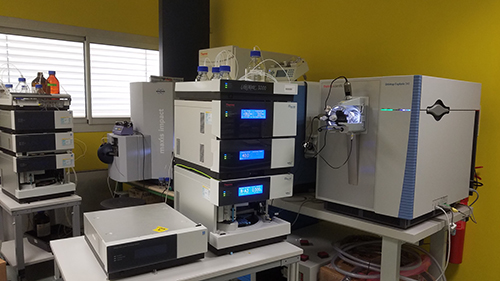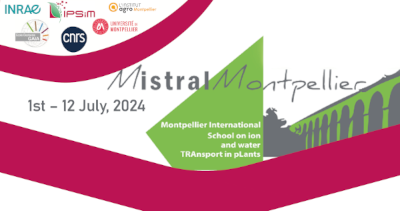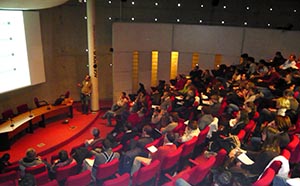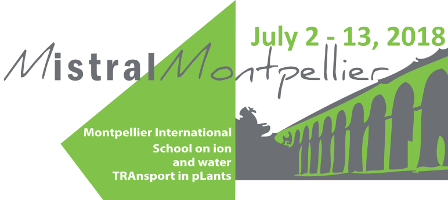
Mass Spectrometry Proteomics Platform


The MSPP Platform of IPSiM belongs to the “Pôle Protéome de Montpellier” (PPM) that regroups regional technological facilities in proteomics analysis. This structure is certified as a proteomic platform by the GIS IBiSA on a national scale. At the institutional level, the MSPP is labeled regional platform in proteomics by INRA.
In the area of functional proteomics, MSPP offers real expertise and technological means in biochemistry, mass spectrometry and bioinformatics.
These means allow us to address many research and development projects in the quantitative analysis of proteins, the analysis of post-translational modifications, and of interactions networks.
The platform hosts programs as part of collaborations or services for a large number of academic research teams in biology, mainly French ones and for some private laboratories.
The members of the platform provide communication and training operations.
Access
In order to define the best as possible the most adapted strategies, we advise you to contact us as soon as your project is drawn up.
For any contact : umr-ipsim-mspp@supagro.fr
The conditions for setting up and running a proteomics project on the platform are detailed in “lien vers charte PPM.
– Prices
A quote will be provided upon request.
| 1 LC-MS/MS analysis | 150 € HT (public) | 480 € HT (private company) |
The price includes :
- Proteomic training provided by the platform staff (if necessary to carry out the project).
- Materials and consumables necessary for the biochemical treatment of samples for analysis in mass spectrometry (electrophoresis gels and enzymes, for example).
- Data acquisition with mass spectrometers.
- Processing (searches in databases for example), validation and formating of results using dedicated bioinformatics tools.
For the services carried out under collaborations, part of the cost of the analyses can be covered by the platform. This participation will depend on the nature of the analyses, the number of samples processed and the degree of collaboration.
http://www1.montpellier.inra.fr/ibip/bpmp/ressources/mspp/mspp_formulaires/contacts.php
Staff
Expertise
Biochemical preparation of samples for proteomics analysis
- Fractionation of complex protein mixtures by electrophoresis
- in gel and in solution enzymatic digestion of proteins
- Phospho-peptides enrichment
Identification and quantification of proteins and peptides by high-resolution mass spectrometry
- Large-scale identification of proteins
- Post-translational modifications analysis (phosphorylations, ubiquitinylations)
- Interactomics
- Peptidomic
- Label-Free quantification for analysis of proteome quantitative variations
- Targeted analysis of proteins by Parallel Reaction Monitoring (PRM)
Bioinformatical analysis of data
- Data analysis and processing (identification, quantification, validation)
- Design and development of data reprocessing chains
Equipment / Technologies
The platform offers advanced technologies for proteomic analysis.
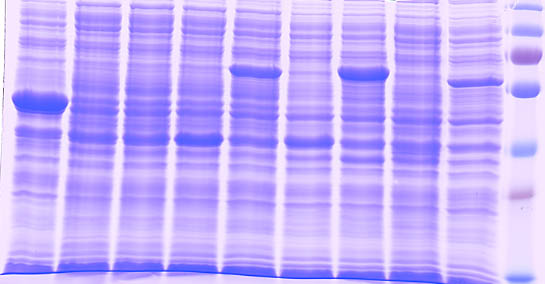 – Biochemical preparation
– Biochemical preparation
The platform has a biochemistry laboratory dedicated to the preparation of samples specific to proteomic analysis.
- Electrophoresis devices Mini-PROTEAN ® (Biorad)
- Speed vac
- Preparative HPLC U3000 (Thermo Fisher Scientific) : off-line fractionation of peptides
Some equipments are made available to collaborators who wish to prepare their samples (subject to training).
– Mass spectrometry
2 nano-HPLC Thermo Fisher Scientific coupled to mass spectrometers (Maxis HD Bruker et Q-exactive + Thermo Fisher Scientific).
- nanoHPLC U3000 FLM (Thermo Scientific™ Dionex™)
- nanoHPLC NCS U3500 RS (Thermo Scientific™ Dionex™)
-
Orbitrap Exploris™ 240 Mass Spectrometer (Thermo Fisher Scientific)
- Mass spectrometer (Bruker)
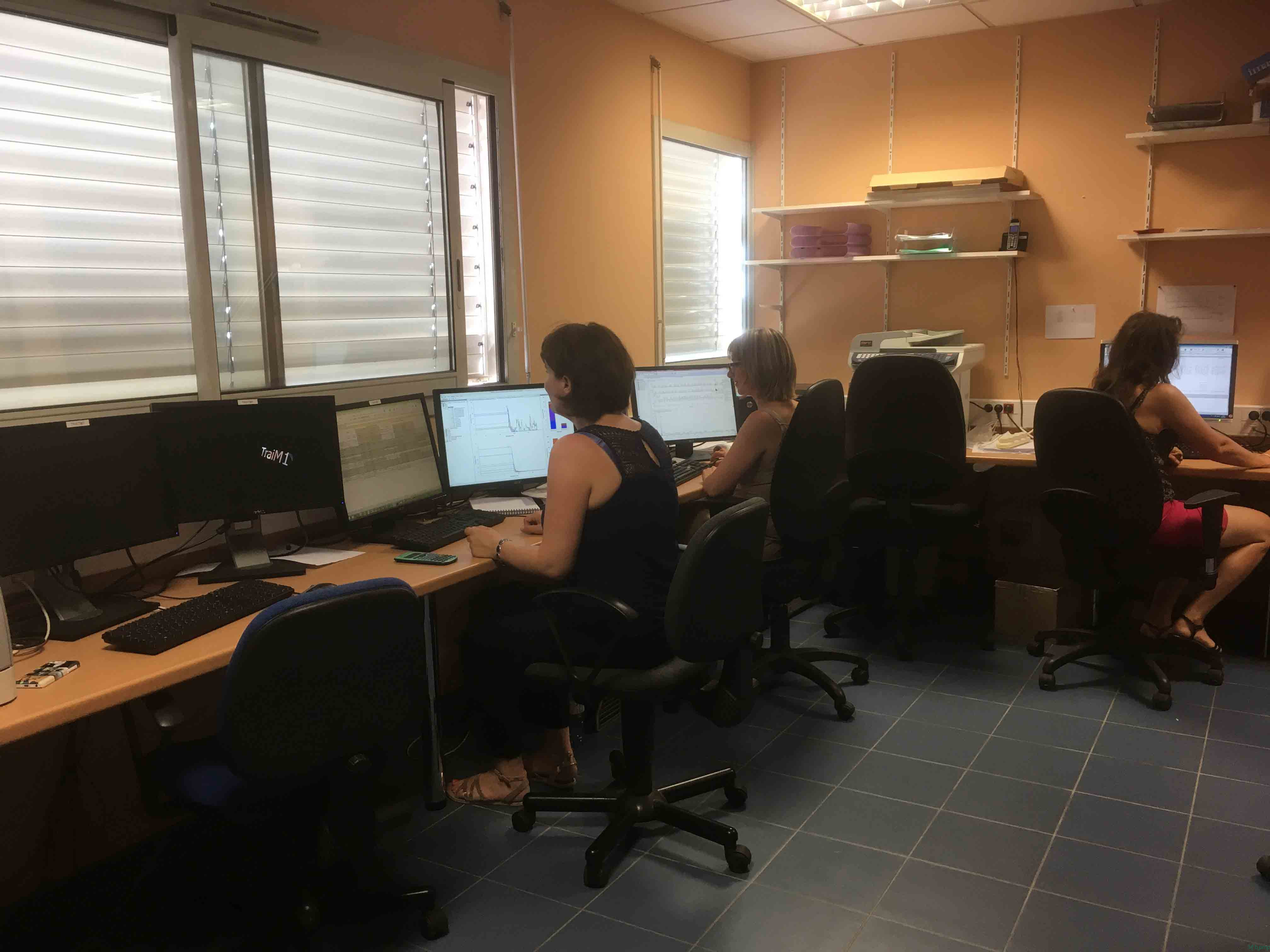 – Informatics and Bioinformatics
– Informatics and Bioinformatics
The platform is equipped with a computer treatment room open to collaborators (according to prior agreement and training).
The software offer relies on software, tools, and hardware dedicated to:
Protein identification
• Mascot 2.4 (Matrix Science) sur serveur :http://www.matrixscience.com/
• X!tandem pipeline: http://pappso.inra.fr/bioinfo/xtandempipeline/
• Proteome Discoverer ™ 1.4 (Thermo Fisher Scientific): https://www.thermofisher.com/order/catalog/product/IQLAAEGABSFAKJMAUH
• ProteinScape 3.1 (Bruker) sur Serveur : mass-spectrometry-and-separations
• Andromeda : maxquant andromeda
Label-free quantification of proteins
• MaxQuant (Max-Planck Institute of Biochemistry): http://www.coxdocs.org/doku.php?id=maxquant:start
• Skyline (MacCoss Lab Software) : https://skyline.ms/project/home/software/Skyline/begin.view
• MassChroq: http://pappso.inra.fr/bioinfo/masschroq/
Statistical analyses
• Scripts development (Pearl, R)
• Perseus (Max-Planck Institute of Biochemistry):http://www.coxdocs.org/doku.php?id=perseus:start
• SAS: https://www.sas.com/fr_fr/software/analytics/stat.html
Data storage
60 Tera-octets in Raid5 distributed over 2 storage bays and backed up daily on delocalized twin bays.
Quality
Redmine server
training
Formations
The platform provides practical training of medium to long duration for the staff of the associated laboratories in scientific collaborations, and for students in the context of internship.
Practical training in biochemistry (as part of collaborations)
- SDS-PAGE gel fractionation
- Liquid and in gel digestion of proteins for their analysis by mass spectrometry
- Phosphopeptides enrichment
BioCampus Montpellier courses
The platform organizes training courses within the framework of the technological courses offered by BioCampus Montpellier:
- Interactomique: approches basées sur la spectrométrie de masse et la résonance plasmonique de surface (28 novembre 2014)
- Les prestations en protéomique du PPM : situation actuelle et futurs développements (21 mars 2014)
Formations INRA, CNRS and INSERM
The platform organizes and participates in teaching in thematic schools in proteomics and including proteomic aspects:
- Research school MassProt 11 septembre – 3 december 2021
- MISTRAL (Montpellier International School on ion and water TRansport in pLants) 30th June – 11th July 2014 and 11th – 22th July 2016)
- – Research school (Sète, 2nd -5th June 2014)
News
A new nano-HPLC
By the end of 2016, MSPP renewed a nano-HPLC (U3000, Thermo Fisher Scientific) installed in 2003. This new generation of nano-HPLC (NCS U3500 RS, Thermo Fisher Scientific) is able to support up to 800 bars, and thus allows to use columns of greater length (50 cm), for example, in order to obtain a greater separation capacity of the peaks during an analysis
A new mass spectrometer “the Exploris 240”
In 2021, MSPP acquired a new mass spectrometer: the Exploris 240 (Thermo Fisher Scientific), which is a benchtop spectrometer allowing precursor ion selection by a high-performance quadrupole and detection by an Orbitrap Fourier transform analyzer. It is a high resolution mass spectrometer with high mass accuracy and high sensitivity. This latest generation equipment was obtained thanks to the support of INRAE (65 k€), the IPSiM and UAR BioCampus Montpellier units (small equipment requests platform 2019, 40 k€) and the MSPP’s own funds (22 k€). Co-funding from IBiSA (Call for Platforms 2019, 90 k€) and the University of Montpellier (Call for Research 2020, 50 k€) was also obtained for the purchase of this mass spectrometer.
Organisation of Mass Prot school
The Permanent Training of the PACA Center, the MassProt’InRA and Formasciences networks organize a “Proteomic – Research School” : from the preparation of the samples to the interpretation, validation and integration of the results. Strategies and practical aspects “, from Tuesday 13th June to Friday 16th June 2017 in Cannes-Mandelieu (06). The aim of this training course is to help the participants to perform their project in proteomics
Congress SMAPP 2017
The Réseau Francophone de Métabolomique et de Fluxomique, the Société Française de Protéomique, the Société Française de Spectrométrie de Masse and the Association Francophone des Sciences Séparatives are organizing in Nantes, from September 5 to 8, 2022, a unique event in analytical sciences. https://www.analytics2022.fr/
Publications
Berger N, Demolombe V, Hem S, Rofidal V, Steinmann L, Krouk G, Crabos A, Nacry P, Verdoucq L, Santoni V✉ (2022) Root membrane ubiquitinome under short-term osmotic stress. Int. J. Mol. Sci., 23(4):1956
Pamukcu S, Cerutti A, Bordat Y, Hem S, Rofidal V, Besteiro S✉ (2021) Differential contribution of two organelles of endosymbiotic origin to iron-sulfur cluster synthesis and overall fitness in Toxoplasma. PLoS Pathog., 17(11):e1010096
Robe K, Stassen M, Chamieh J, Gonzalez P, Hem S, Santoni V, Dubos C✉, Izquierdo E✉ (2021) Uptake of Fe-fraxetin complexes, an IRT1 independent strategy for iron acquisition in Arabidopsis thaliana. bioRxiv,
Robe K, Conéjéro G, Gao F, Lefebvre-Legendre L, Sylvestre-Gonon E, Rofidal V, Hem S, Rouhier N, Barberon M, Hecker A, Gaymard F, Izquierdo E✉, Dubos C✉ (2021) Coumarin accumulation and trafficking in Arabidopsis thaliana: a complex and dynamic process. New Phytol., 229(4):2062-2079
Jacquot A, Chaput V, Mauriès A, Li Z, Tillard P, Fizames C, Bonillo P, Bellegarde F, Laugier E, Santoni V, Hem S, Martin A, Gojon A, Schulze W, Lejay L✉ (2020) NRT2.1 C-terminus phosphorylation prevents root high affinity nitrate uptake activity in Arabidopsis thaliana. New Phytol., 228(3):1038-1054
Berger N, Vignols F, Touraine B, Taupin-Broggini M, Rofidal V, Demolombe V, Santoni V, Rouhier N, Gaymard F, Dubos C✉ (2020) A global proteomic approach sheds new light on potential iron-sulfur client proteins of the chloroplastic maturation factor NFU3. Int. J. Mol. Sci., 21(21):8121
Berger N, Vignols F, Przybyla-Toscano J, Roland M, Rofidal V, Touraine B, Zienkiewicz K, Couturier J, Feussner I, Santoni V, Rouhier N, Gaymard F, Dubos C✉ (2020) Identification of client iron-sulfur proteins of the chloroplastic NFU2 transfer protein in Arabidopsis thaliana. J. Exp. Bot., 71(14):4171-4187
Serre NBC, Sarthou M, Gigarel O, Figuet S, Corso M, Choulet J, Rofidal V, Alban C, Santoni V, Bourguignon J, Verbruggen N, Ravanel S✉ (2020) Protein lysine methylation contributes to modulating the response of sensitive and tolerant Arabidopsis species to cadmium stress. Plant Cell Environ., 43(3):760-774
Gao F, Robe K, Bettembourg M, Navarro N, Rofidal V, Santoni V, Gaymard F, Vignols F, Roschzttardtz H, Izquierdo E, Dubos C✉ (2020) The transcription factor bHLH121 interacts with bHLH105 (ILR3) and its closest homologs to regulate iron homeostasis in Arabidopsis. Plant Cell, 32(2):508-524
Stavrinides AK, Dussert S, Combes M-C, Fock-Bastide I, Severac D, Minier J, Bastos-Siqueira A, Demolombe V, Hem S, Lashermes P, Joët T✉ (2020) Seed comparative genomics in three coffee species identify desiccation tolerance mechanisms in intermediate seeds. J. Exp. Bot., 71(4):1418-1433
Roland M, Przybyla-Toscano J*, Vignols F*, Berger N*, Azam T, Christ L, Santoni V, Wu H-C, Dhalleine T, Johnson MK, Dubos C, Couturier J, Rouhier N✉ (2020) The plastidial Arabidopsis thaliana NFU1 protein binds and delivers [4Fe-4S] clusters to specific client proteins. J. Biol. Chem., 295(6): 1727-1742
Quality and Acknowledging
- Acknowledging
In the Acknowledgments and / or in the Materials and Methods section, the technical contribution of the MSPP platform must be underlined and clearly mentioned and the personnel directly involved, when they are not co-authors, can be named.
Example: « Mass spectrometry experiments were carried out using the facilities of the Montpellier Proteomics Platform (PPM, BioCampus Montpellier) »
[ Acknowledging core facilities ] - Quality
In order to fully comply with the quality criteria of the IBiSA platforms, the Proteomic Mass Spectrometry Proteomic Platform (MSPP) platform was certified ISO 9001: 2008 from 02/02/2009 then become ISO 9001: since may 11 2017 to april 29 2020 for the domain: “Research, expertise and services in proteomics in the fields of biology and health “
On 15/07/2015, this certification has been extended to the entire PPM.

